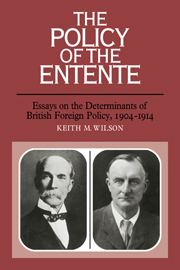Book contents
- Frontmatter
- Contents
- Acknowledgements
- Introduction
- 1 The Poverty of the Entente Policy
- 2 The Politics of Liberal Foreign Policy I
- 3 The Politics of Liberal Foreign Policy II
- 4 The Dissimulation of the Balance of Power
- 5 The Fiction of the Free Hand
- 6 The Invention of Germany
- 7 The Military Entente with France
- 8 The Cabinet's Decision for War, 1914
- Notes
- Bibliography
- Index
1 - The Poverty of the Entente Policy
Published online by Cambridge University Press: 04 August 2010
- Frontmatter
- Contents
- Acknowledgements
- Introduction
- 1 The Poverty of the Entente Policy
- 2 The Politics of Liberal Foreign Policy I
- 3 The Politics of Liberal Foreign Policy II
- 4 The Dissimulation of the Balance of Power
- 5 The Fiction of the Free Hand
- 6 The Invention of Germany
- 7 The Military Entente with France
- 8 The Cabinet's Decision for War, 1914
- Notes
- Bibliography
- Index
Summary
On 1 March 1893 Lord Rosebery addressed the members of the Colonial Institute in defence of policies of his which the leader of his party, Mr W. E. Gladstone, had described as ‘imbued with the spirit of territorial grab’:
It is said that our Empire is already large enough and does not need extension. That would be true enough if the world were elastic, but, unfortunately, it is not elastic, and we are engaged at the present moment, in the language of the mining camps, in ‘pegging out claims for the future’. We have to consider, not what we want now, but what we shall want in the future … we should, in my opinion, grossly fail in the task that has been laid upon us did we shrink from responsibilities and decline to take our share in a partition of the world which we have not forced on, but which has been forced upon us.
By the turn of the century the British Empire was the largest and most widespread of all the empires acquired by the European Powers. In addition to safeguarding the territories of which this Empire consisted, the British had also to protect a volume of sea-borne trade amounting to an annual value of 1200 million pounds sterling, and 9 million tons of shipping upon which the British people depended, amongst other things, for the security of their food supply.
- Type
- Chapter
- Information
- The Policy of the EntenteEssays on the Determinants of British Foreign Policy, 1904–1914, pp. 4 - 16Publisher: Cambridge University PressPrint publication year: 1985



